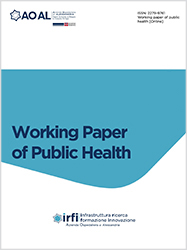The effectiveness of correct information and its impact on patient compliance. A cohort study in the Hemodynamics Department of the Azienda Ospedaliera di Alessandria.
Accepted: 11 July 2016
All claims expressed in this article are solely those of the authors and do not necessarily represent those of their affiliated organizations, or those of the publisher, the editors and the reviewers. Any product that may be evaluated in this article or claim that may be made by its manufacturer is not guaranteed or endorsed by the publisher.
Background: Diagnostic and therapeutic invasive procedures can be a source of physical and emotional pain and discomfort. Anxiety and discomfort represents a priority nursing problem in the patient waiting for invasive procedures,affecting his clinical course. It is in this stressful situation that the nurse is proposed as the most suitable figure to assess and treat anxiety and to improve the hospital experience of the patients, ensuring a calm and reassuring environment and implementing an appropriate therapeutic approach. In fact, relaxation reduces muscle tension, decreases heart rate, can improve ejection volume and strengthens the patient's sense of control over pain. Aim: The aim of this thesis is to find out how much the information given to the person undergoing a diagnostic and/or therapeutic procedure improves the level of anxiety and compliance of the patient himself. The thesis wants to focus on the management and the presence of anxiety pre-procedure, and demonstrate how the management of this aspect, through good assessment and adequate information can favorably affect the quality of the procedure itself and an adequate intra and post-procedural compliance. Methodology: In this study, two groups of users were randomly compared. The first group was provided with accurate and complete information on the procedure to which they will be subjected, while the second group was given only summary information, not complete. It will be studied then, the compliace of the two groups, determining the major differences between the behaviors. The study was conducted through the use of the APAIS questionnaire in which anxiety about anesthesia and invasive surgery are evaluated, as well as the final combination of the same. At the same time that the questionnaire was administered, heart rates and respiratory rates were also measured to patients. Finally, through a post-procedure interview will be administered an ad hoc constructed grid with the main fears or discomforts experienced by the patients during the invasive procedure, and a Numeric Rating Scale (NRS) to estimate the highest level of pain and discomfort perceived during the procedure. The study period was from March to September 2014. Results: When comparing informed patients before and after treatment, there is a decrease of about 4 points, as from 12.88 the anxiety level of patients after information decreases to 8.92. Comparing the values of the informed patients, a significant decrease in the need for information between before and after treatment can be seen by defining a mean value around 2, compared to the pre-treatment value of 8.6. In the group of informed patients, it can be seen that the average heart and respiratory rate is lower than the group of uninformed patients, standing for the fact that the informed patients were calmer at the time they went to undergo the procedure, compared to the other group. Conclusions: The data of the study, although with some limitations related to the instrument and methodology, show that providing adequate and comprehensive information to patients before any procedure significantly affects their perceived level of anxiety. In addition, it can be seen from the study that all patients, both those belonging to the informed group and those belonging to the uninformed group present a high need for information.
PAGEPress has chosen to apply the Creative Commons Attribution NonCommercial 4.0 International License (CC BY-NC 4.0) to all manuscripts to be published.

 https://doi.org/10.4081/wpph.2015.6698
https://doi.org/10.4081/wpph.2015.6698




